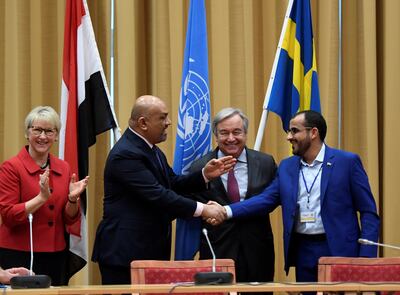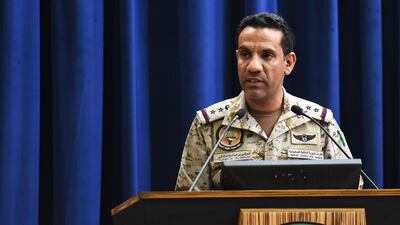Yemen's Houthi rebels show no intentions of implementing the UN-brokered ceasefire deal in Hodeidah, the Arab Coalition supporting the government said on Monday.
The government said there would be no further negotiations with the rebels until they acted on the agreement reached at UN-brokered talks in Sweden last month.
Colonel Turki Al Malki, coalition spokesman, said the rebels were breaching the ceasefire in the port city of Hodeidah by continuously bombing mosques and targeting government forces.
"The Houthis have no intention of implementing the Swedish peace deal and have violated the agreement 368 times," he said.
The talks in Sweden saw a breakthrough when warring parties agreed on a ceasefire in Hodeidah, which went into effect on December 18, as well as the withdrawal of all forces from the area.
Col Al Malki said the coalition remained committed to finding a political solution to the war in Yemen, but a government official told The National that it would not take part in further talks until the rebels honoured their commitments.
"We have said before and continue to say that we will not attend the next round of talks unless the Houthis comply with what was agreed in Sweden," the official said.

A rebel withdrawal from Hodeidah's ports has been contentious, with accusations that the Houthis handed over control to their own forces rather than local forces as stipulated in the agreement. A prisoner exchange deal has yet to be implemented following disagreements over the lists of detainees.
With the agreements indanger of collapse, the UN special envoy to Yemen, Martin Griffiths, travelled to Sanaa on Saturday for talks with Houthi leaders in Yemen's rebel-held capital.
Mr Griffiths left Yemen on Monday morning without any public statement but senior rebel leader Mohammed Ali Al Houthi said on Sunday that talks on Yemen’s war-ravaged economy could be held in Jordan's capital.
This was dismissed by the government official.
"The next round of talks will most likely be held in Kuwait and not in Jordan, and will focus on issues such as Hodeidah, reopening the rebel-held airport and the country's fragile economy," the official said.
Jordan's foreign ministry denied that Yemen’s warring parties had sought to hold talks in Amman.
_____________
Read more:
UN envoy Martin Griffiths returns to Yemen with Hodeidah truce in the balance
Yemen's Houthi rebels are undermining Hodeidah ceasefire, Security Council warned
UN envoy Martin Griffiths pushes to salvage peace deal in Hodeidah
_____________
The UN said after the talks in Sweden last month that another round was being planned early this year to discuss a framework for political negotiations and a transitional governing body.
"Mr Griffiths spent the last two days discussing with Houthi leaders what was agreed in Stockholm, he is now on his way to Riyadh to follow up on the progress," a UN source told The National.
Yemen’s President Abdrabu Mansur Hadi and many of his officials are based in the Saudi capital.
Mr Hadi has accused the rebels of sabotaging the ceasefire agreement.
“The Houthis do not want peace and are stalling the implementation of what was agreed in Stockholm,” he said during a meeting with US Ambassador to Yemen Mathew Tueller.
The president called on the international community to take a firm position in pressuring the Houthis to abide by what was agreed in Sweden.
The ceasefire accord is regarded as the most significant step towards ending the conflict that has raged in Yemen since 2015 and created a humanitarian crisis where two-thirds of the population is dependent on humanitarian aid.
Despite the truce, government forces and residents in Hodeidah reported an increase in Houthi attacks and the arrival of rebel reinforcements on Sunday.
The Stockholm agreement stipulates that armed forces from both sides must withdraw Hodeidah's three ports, the entry point for most of the aid and food shipped to Yemen, followed by a withdrawal from the city and the rest of the province.
Local forces will then take control of the city and ports, but they will remain under UN supervision.


